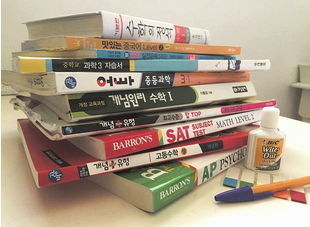![Test prep is a fact of life for many Korean students. [Jumi Yoon]](http://www.jstudentboard.com/reporter/wp-content/uploads/2015/08/Screen-Shot-2015-08-26-at-2.04.18-PM-300x220.png)
Although private tutoring and educational institutes help students overcome their weaknesses in certain subjects, spending excessive time on such classes may be stressful.
In a JSR survey of 71 Korean high school students, 75 percent of the students answered that they take private tutoring classes or go to private institutes. Forty-four percent answered that they go to their academies more than four times a week.
“Private institutes are pretty stressful,” said a freshman survey participant in Suwon-si.
“For example,” the student added, “for English, I have to memorize 120 vocabulary words and read 40 short passages for homework. In total, I go to four different academies [for] English, Korean, Math, and Science. I have classes every day except Monday. I come home at 11 pm and sleep around 12:30 am at the earliest, and 3:00 or 4:00 at the latest.”
In the survey, 90 percent of the students answered that they feel academic stress; fifty-two percent said they feel it every single day.
Yet Sangwoo Park, a first-year student at Hyowon High School, believes there are both positive and negative effects of private education.
“My negative thoughts about private education changed after I came to high school,” he told JSR.
“Seeing my friends getting help for difficult high school classes [through private institutes] changed my thoughts.” He continued, “I think the best way is to practice self-directed learning, but [it is useful to] get help – [with] private lessons – when it’s necessary.”
“The main problem about private education is, though, that it lessens the time for students to study and review the material by themselves,” Park added. “It sometimes lead students to rely heavily on private tutoring, not being able to solve problems and self-study.”
Through private education, students study school material ahead of time. According to the survey, 80 percent of students answered are at least one semester ahead of the school curriculum. Twenty-five percent of them responded that they were ahead of the school curriculum by more than a year, and some said they were already two years ahead. However, some believe this negatively impacts the class environment.
“The problem with prerequisite learning is that students become less attentive in class,” said Helen Lee, a first-year student at Chang Hyun High School. “Many students do not concentrate [during class] because they have already learned the material through private education. They chat disrespectfully during class or sleep through [it].”
Yet, according to Lee, this might be unavoidable due to the current educational climate in Korea.
“Although prerequisite learning changes the school’s learning environment negatively, the classes are too difficult for those who do not study ahead,” she said. “I hope educators find a way to solve this problem.”

